In the rapidly evolving landscape of energy transportation, Liquefied Natural Gas (LNG) has emerged as a pivotal player, offering a cleaner and more efficient alternative to traditional fossil fuels. As the demand for LNG surges, so does the necessity for specialized transportation solutions. At CarMax Trailer, we understand that LNG truck capacity is not merely a specification but a critical factor that influences operational efficiency, safety, and economic viability. This comprehensive guide delves into the intricacies of LNG truck capacity, empowering you to make informed decisions that propel your business forward.
Understanding LNG Truck Capacity
LNG truck capacity refers to the maximum volume of liquefied natural gas that a trailer can safely transport. This capacity is measured in cubic meters (m³) or liters and is influenced by various factors including trailer design, insulation technology, and regulatory standards.
Key Components Influencing Capacity
| Component | Impact on Capacity |
|---|---|
| Trailer Design | Determines the structural limits and space utilization. |
| Insulation Technology | Affects the amount of LNG that can be stored without excessive evaporation. |
| Regulatory Standards | Sets legal limits on maximum allowable capacity for safety. |

The Importance of Selecting the Right Capacity
Choosing the appropriate LNG truck capacity is pivotal for several reasons:
- Operational Efficiency: Optimal capacity ensures maximum LNG transport per trip, reducing the number of journeys and fuel consumption.
- Cost-Effectiveness: Higher capacities can lead to lower cost per unit transported, enhancing profitability.
- Regulatory Compliance: Adhering to regional and international standards prevents legal complications and ensures safety.
- Safety Assurance: Proper capacity selection minimizes the risk of overloading, thereby safeguarding personnel and cargo.
Typical LNG Truck Capacities in the Market
The LNG transportation sector offers a range of truck capacities to cater to diverse needs:
| Capacity Range | Suitable For |
|---|---|
| 10-20 m³ | Small-scale operations and regional deliveries |
| 20-40 m³ | Medium-scale transport with balanced efficiency |
| 40-60 m³ | Large-scale operations requiring high-volume transport |
At CarMax Trailer, we offer customizable LNG truck capacities that align with your specific requirements, ensuring that you harness the optimal balance between capacity and performance.
CarMax Trailer’s LNG Truck Capacity Options
CarMax Trailer prides itself on delivering versatile and reliable LNG transportation solutions. Our range includes:
- Compact Models (10-20 m³): Ideal for urban deliveries and short-haul routes.
- Standard Models (20-40 m³): Balances capacity and maneuverability for medium-distance transportation.
- Heavy-Duty Models (40-60 m³): Maximizes cargo volume for long-haul and large-scale operations.
Each model is engineered with state-of-the-art insulation and safety features, ensuring that your LNG transport is both efficient and secure.
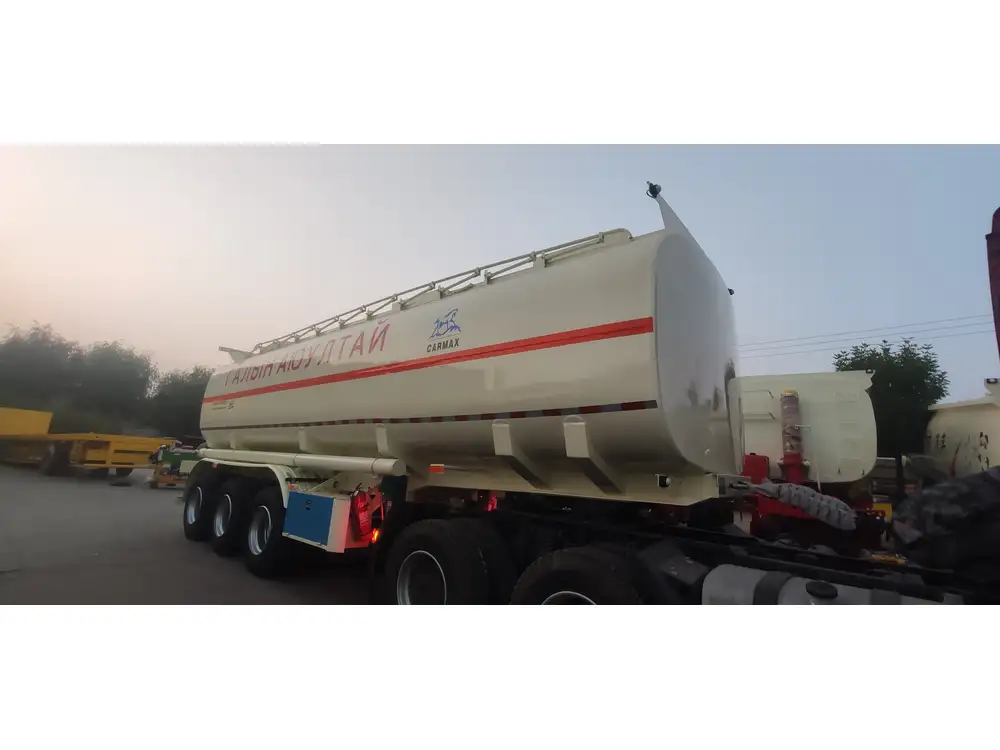
Factors Influencing LNG Truck Capacity Selection
Transportation Requirements
Assessing the specific needs of your operation is paramount. Consider the following:
- Volume of LNG to be Transported: Determine the average and peak LNG volumes required.
- Route Characteristics: Evaluate road conditions, distance, and geographical challenges.
- Delivery Frequency: Higher frequencies may benefit from larger capacities to minimize trips.
Regulatory Standards
Compliance with regional and international regulations is non-negotiable. Key considerations include:
- Maximum Load Limits: Adhere to legal standards for truck weights and dimensions.
- Safety Certifications: Ensure trailers meet industry safety standards such as ISO certifications.
- Emission Standards: Align with environmental regulations to reduce carbon footprint.
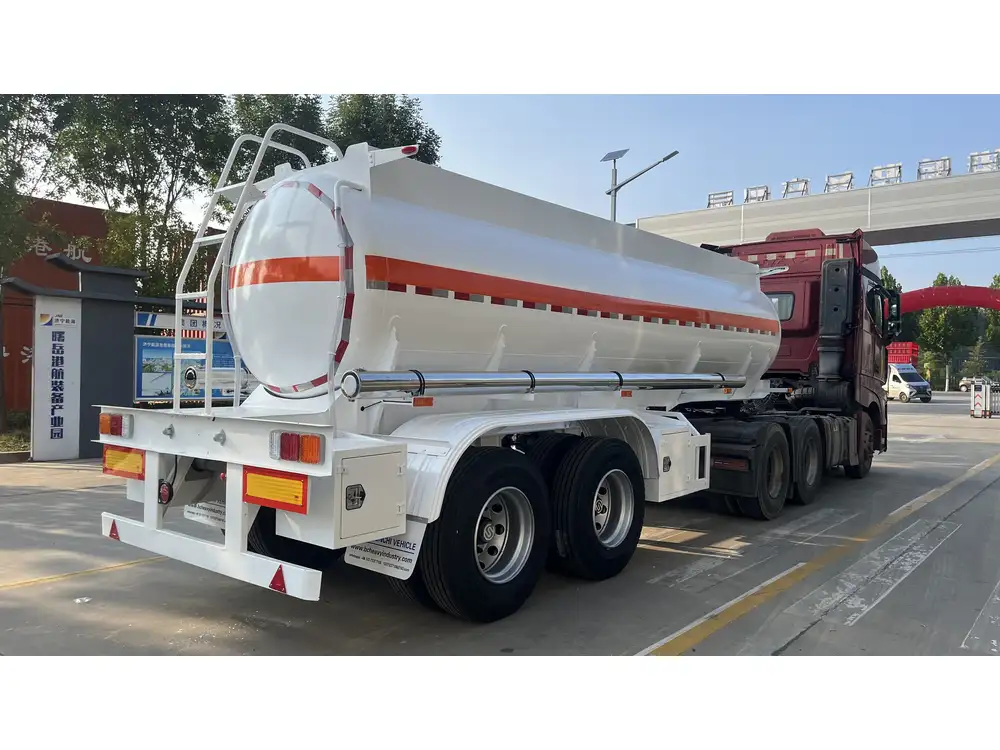
Safety Considerations
Safety is paramount in LNG transportation. Factors to consider:
- Structural Integrity: Robust construction to withstand accidents and harsh conditions.
- Advanced Safety Features: Incorporation of emergency shut-off valves, pressure release systems, and leak detection technologies.
- Training and Protocols: Ensuring personnel are trained in handling LNG safely.
Economic Efficiency
Balancing capacity with cost is essential for sustainable operations:
- Fuel Consumption: Larger capacities may offer better fuel efficiency per unit transported.
- Maintenance Costs: Regular upkeep of larger trucks may incur higher expenses but can be offset by increased transport capacity.
- Initial Investment: Higher capacity trailers require a greater initial investment but can lead to long-term savings.
Comparing LNG Truck Capacities: CarMax vs. Competitors
When selecting an LNG truck, it is crucial to compare CarMax Trailer’s offerings with other market options:
| Feature | CarMax Trailer | Competitors |
|---|---|---|
| Customization | High degree of customization | Limited customization |
| Safety Features | Advanced safety systems | Standard safety features |
| Insulation Technology | Superior insulation for minimal LNG loss | Standard insulation |
| Capacity Range | 10-60 m³ | 15-50 m³ |
| After-Sales Support | Comprehensive support and maintenance | Varies, often limited |
CarMax Trailer stands out with its superior insulation technology, extensive customization options, and robust safety features, making our LNG trucks a preferred choice for discerning customers.
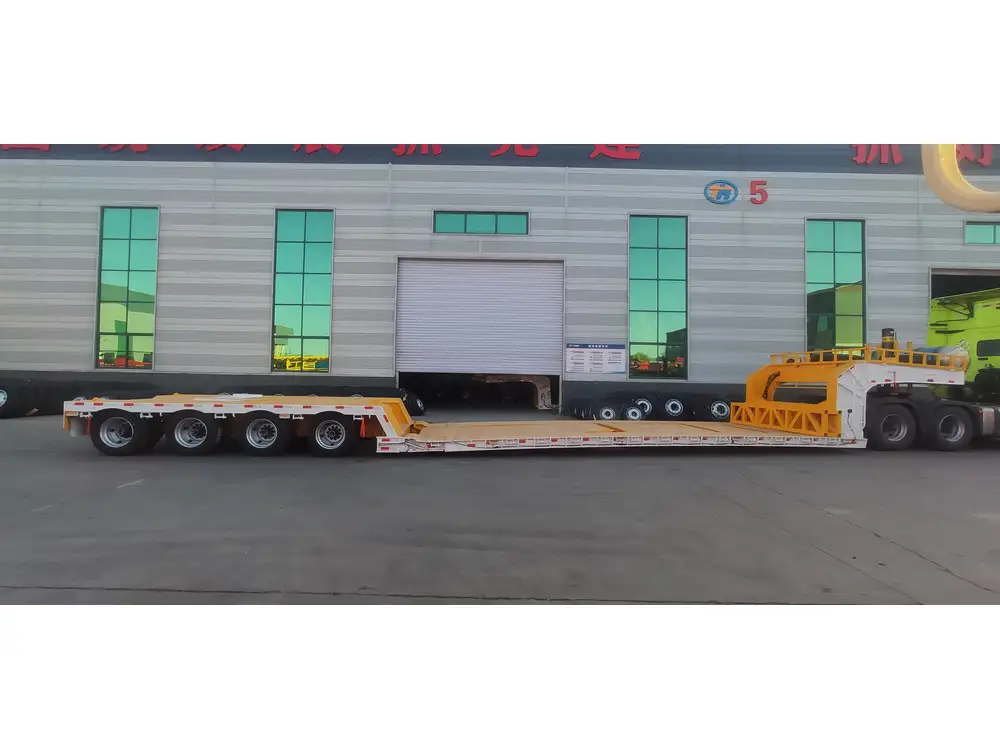
Innovations in LNG Truck Capacity Design by CarMax Vehicle
At CarMax Trailer, innovation drives our approach to LNG truck design. Our recent advancements include:
Enhanced Insulation Materials
Utilizing advanced materials that reduce LNG evaporation rates, allowing for greater capacity without compromising safety or efficiency.
Modular Design
Introducing modular components that enable easy scalability of truck capacity based on fluctuating demands, ensuring adaptability to changing market needs.
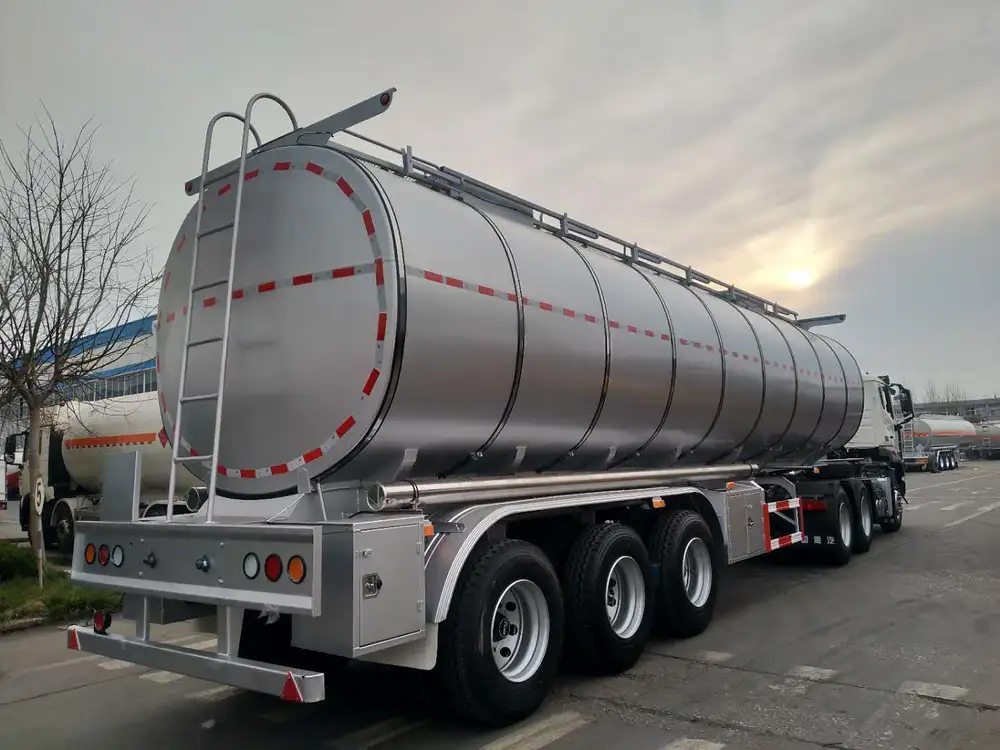
Smart Monitoring Systems
Integrating IoT-enabled sensors that provide real-time monitoring of LNG levels, temperature, and pressure, enhancing operational oversight and safety.
Aerodynamic Enhancements
Incorporating aerodynamic designs that reduce fuel consumption and improve overall efficiency, providing cost savings and environmental benefits.
Case Studies: Optimal LNG Truck Capacity for Various Industries

Case Study 1: Urban Delivery Services
Challenge: A logistics company required efficient LNG transportation within a congested city environment.
Solution: CarMax Trailer provided a compact 15 m³ LNG truck with enhanced maneuverability and advanced safety features, ensuring seamless operations in tight urban spaces.
Outcome: Reduced delivery times, lower fuel consumption, and improved delivery efficiency.
Case Study 2: Long-Haul Transport
Challenge: A national energy supplier needed to transport large volumes of LNG across long distances.
Solution: Our heavy-duty 50 m³ LNG trucks were deployed, featuring superior insulation and smart monitoring systems.
Outcome: Increased transport capacity per trip, enhanced safety, and significant cost savings on fuel and maintenance.
Case Study 3: Industrial Supply Chain
Challenge: An industrial client required flexible LNG transportation to support fluctuating production schedules.
Solution: CarMax Trailer offered a modular trailer system allowing for capacity adjustments between 20-40 m³ as needed.
Outcome: Greater operational flexibility, optimized resource utilization, and improved supply chain reliability.

Maintenance and Operational Considerations for LNG Trucks
Proper maintenance and operation are critical to maximizing the lifespan and efficiency of LNG trucks. Key practices include:
Regular Inspections
Conducting routine checks of structural integrity, insulation performance, and safety systems to identify and address potential issues proactively.
Scheduled Maintenance
Implementing a comprehensive maintenance schedule that includes cleaning, testing of safety features, and servicing of mechanical components.
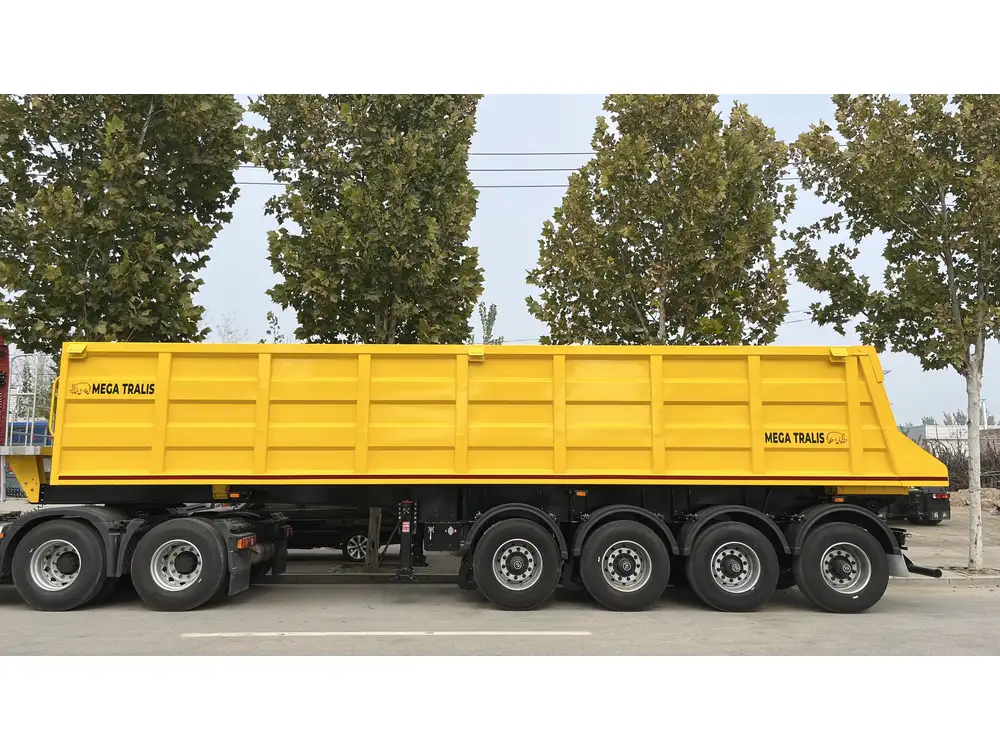
Training and Certification
Ensuring that all personnel involved in LNG transportation are adequately trained and certified to handle LNG safely and efficiently.
Record Keeping
Maintaining detailed records of maintenance activities, inspections, and operational data to track performance and compliance.
Efficiency Monitoring
Utilizing monitoring systems to track fuel consumption, LNG loss rates, and operational efficiency, enabling continuous improvement.

Future Trends in LNG Truck Capacity
The LNG transportation sector is poised for significant advancements driven by technological innovation and shifting market demands. Anticipated trends include:
Increased Automation
Incorporating autonomous driving technologies to enhance safety, reduce human error, and optimize fuel efficiency.
Sustainable Materials
Adopting eco-friendly materials and manufacturing processes to reduce the environmental impact of LNG trucks.
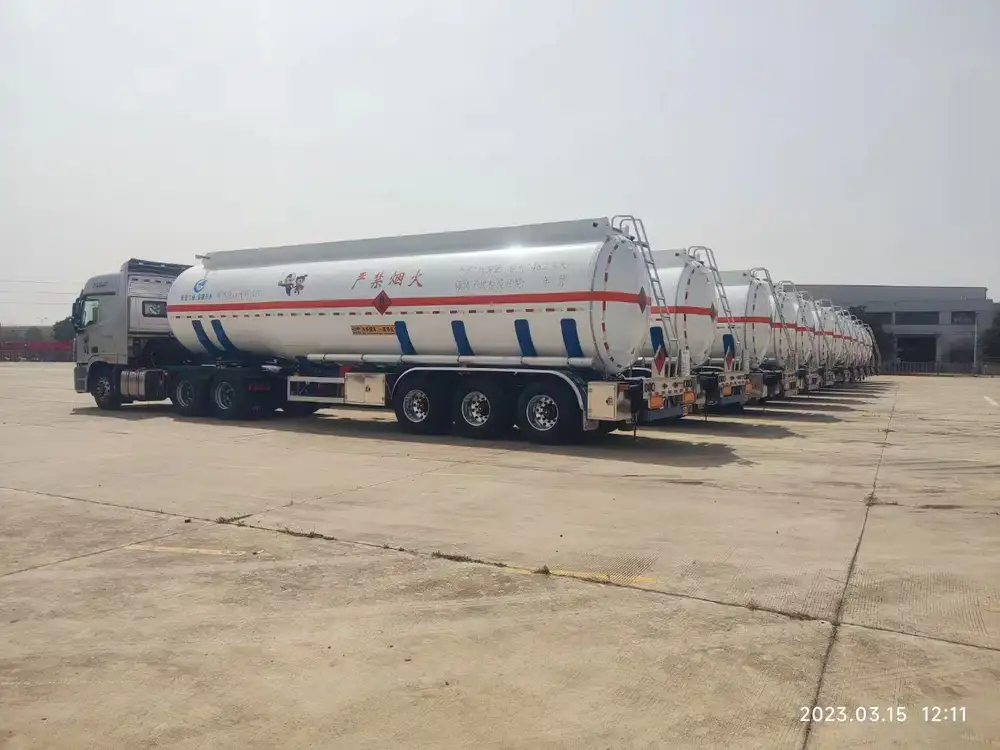
Enhanced Connectivity
Leveraging IoT and AI to provide predictive maintenance, real-time analytics, and improved operational management.
Expanded Capacity Options
Developing trailers with even greater capacity potentials while maintaining safety and efficiency standards to meet growing LNG demands.
Integration with Renewable Energy Sources
Facilitating the transition to renewable energy by designing LNG trucks that can seamlessly integrate with alternative fuel systems.
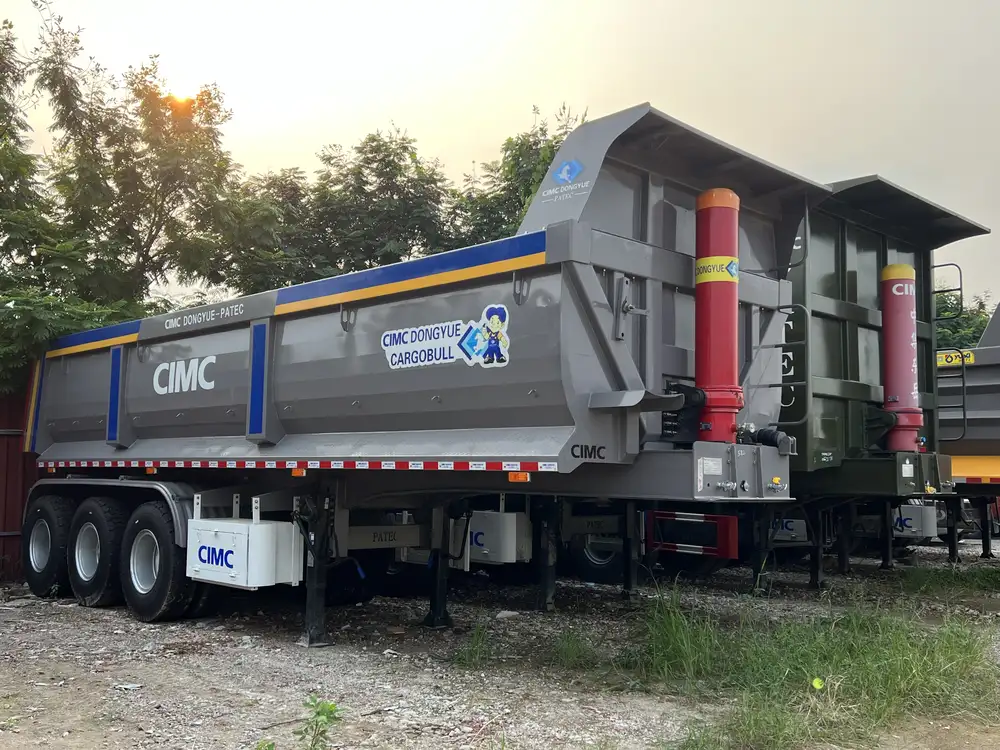
Why Choose CarMax Trailer for Your LNG Transportation Needs
CarMax Trailer is committed to delivering excellence in LNG transportation through:
- Unmatched Quality: Our trailers are built to the highest standards, ensuring durability and reliability in all conditions.
- Customization: We tailor our solutions to meet your specific capacity and operational requirements.
- Innovation: Continual investment in research and development ensures that our trailers incorporate the latest technological advancements.
- Customer Support: Our dedicated support team is available to assist with maintenance, operations, and any queries you may have.
- Sustainability: We prioritize eco-friendly practices and materials to support a greener future.
Partnering with CarMax Trailer means choosing a leader in LNG transportation who prioritizes your success and safety.
Frequently Asked Questions
1. What factors should I consider when selecting the LNG truck capacity for my business?
When choosing LNG truck capacity, consider your average and peak LNG transport volumes, route characteristics, delivery frequency, regulatory compliance, safety requirements, and economic efficiency. Assessing these factors ensures that you select a capacity that aligns with your operational needs and business goals.
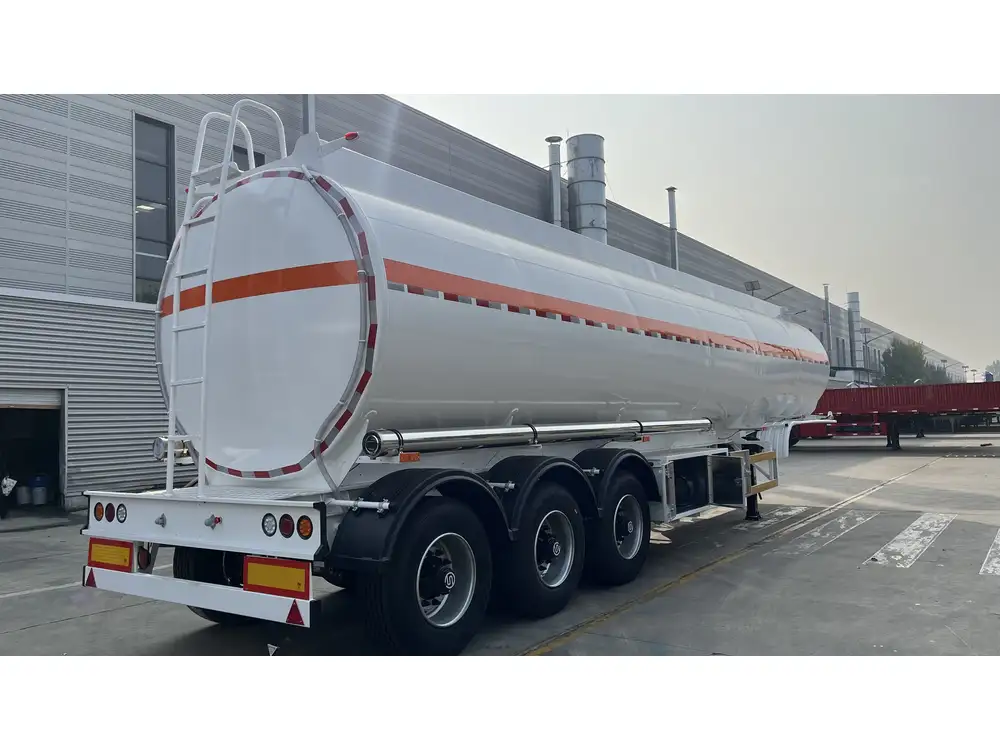
2. How does CarMax Trailer ensure the safety of its LNG trucks?
CarMax Trailer incorporates advanced safety features such as emergency shut-off valves, pressure release systems, and leak detection technologies. Our trailers are designed to meet stringent safety standards, and we provide comprehensive training and maintenance support to ensure ongoing safety and reliability.
3. Can CarMax Trailer customize LNG trucks to fit specific operational needs?
Yes, CarMax Trailer offers a high degree of customization to tailor LNG truck capacities and features according to your unique operational requirements. Whether you need a compact model for urban delivery or a heavy-duty trailer for long-haul transport, we can design a solution that fits your needs.
4. What maintenance practices are essential for LNG trucks to maintain optimal capacity?
Essential maintenance practices include regular structural inspections, scheduled servicing of mechanical components, testing of safety systems, training for personnel, and efficient record-keeping. Utilizing smart monitoring systems can also aid in tracking LNG levels and operational efficiency, enabling proactive maintenance and performance optimization.
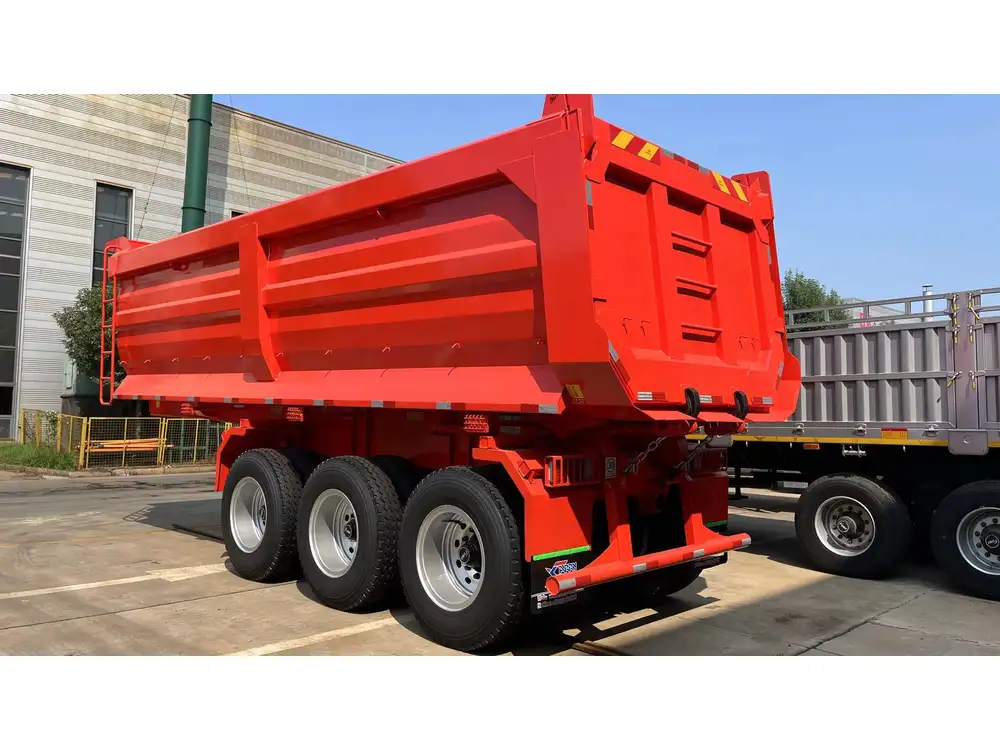
5. How does LNG truck capacity impact overall transportation efficiency and costs?
Selecting the appropriate LNG truck capacity directly influences the number of trips required, fuel consumption, and operational costs. An optimal capacity maximizes the volume of LNG transported per trip, reducing the number of journeys needed, lowering fuel and maintenance expenses, and enhancing overall cost-effectiveness and efficiency of your transportation operations.



